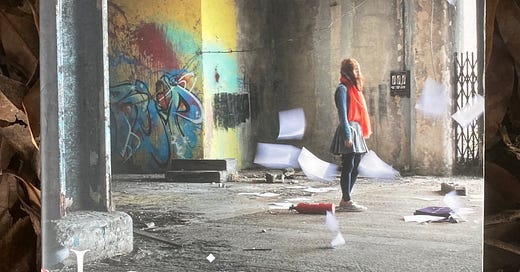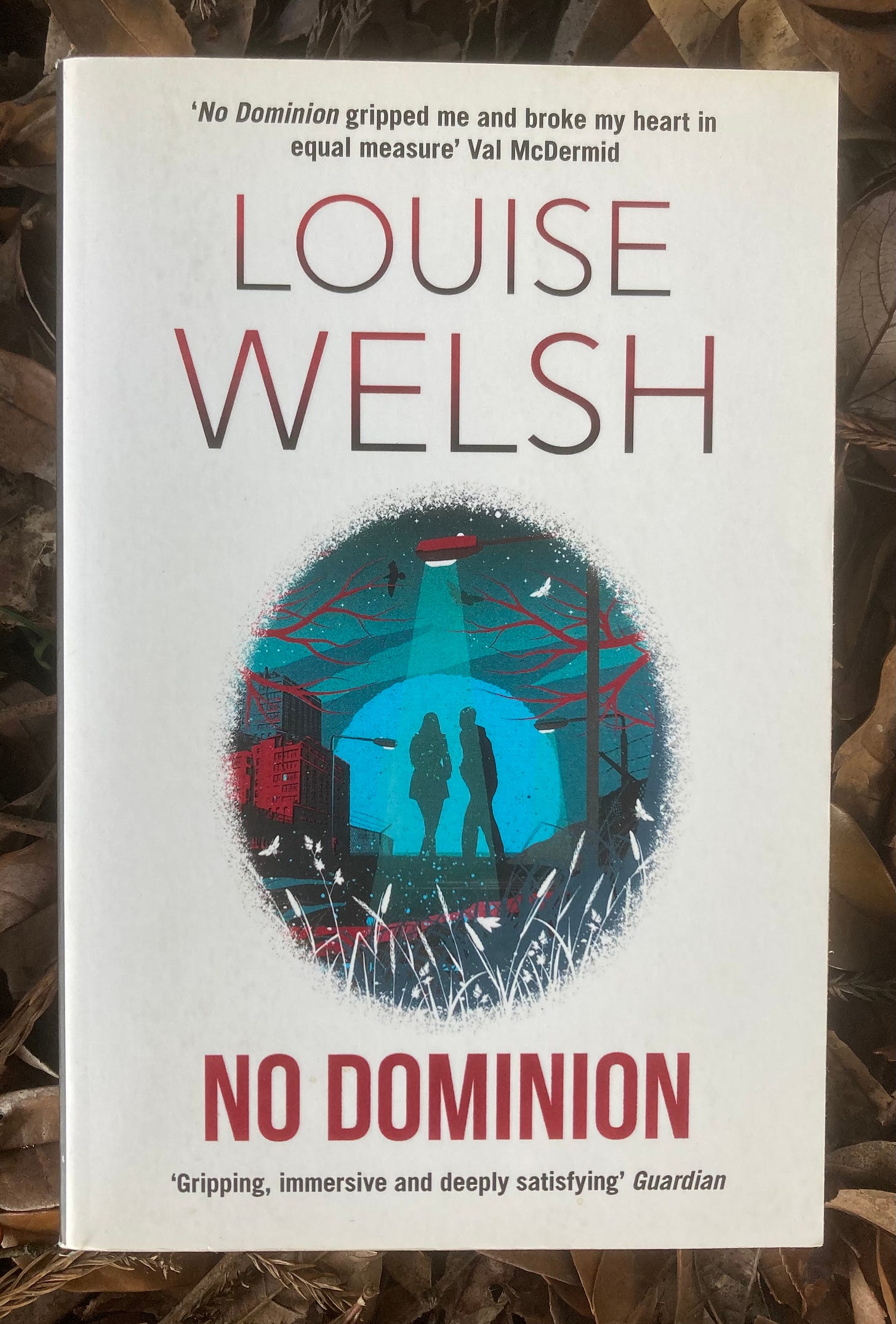Watching the World Burn: Louise Welsh
A truncated version of this was published by Shoreline of Infinity
After reading a fair bit of post-apocalyptic dystopia recently I decided it was high time to share this review of Louise Welsh’s Plague Trilogy. WARNING: Contains unavoidable mild spoilers.
The Plague Trilogy:
1. A Lovely Way to Burn (2014)
2. Death is a Welcome Guest (2015)
3. No Dominion (2017)
To begin by making a crass generalisation and simplifying wildly, there are two kinds of science fiction: that which is interested in ideas and that which is interested in people. Of course, like all things, it is a dialectic tug between the two – to work, a story needs both people and ideas – but there is always an uneven balance. Asimov’s Foundation series lays the emphasis more on ideas than characters, an oft-cited reason for the criminal fact that it took so long to come to screen and when it did was massively changed. Margaret Atwood’s The Handmaid’s Tale is explicit in the title: it’s about Offred first and foremost. The ideas are key, but it’s Offred’s story, not a thought experiment. Iain M. Banks swung between the two and you only have to look at a Culture fan group’s “favourite Culture books” discussion to see a clear divide between those who love the Culture as an intellectual and imaginative entity, and those who focus on the characters – carbon and synthetic – that inhabit his universe.
I’m aware some of you are probably shouting “but what about…” right now. I am not dismissing either side. The greatest science fiction does both fabulously, but as writers and readers, we all have a preference. For me, it’s characters all the way. You can have the best idea in the history of ideas but without characters that grab me, fascinate me, entice me to follow them on their journey, your idea never gets off the launch pad. This is why, for me, the greatest science fiction writer of all time is John Wyndham.
The ideas are brilliant – the coincidence of a comet that blinds people with the evolution of a predatory kind of plant; an invisible friend that turns out to be an advance scout from an alien world; telepathic children in a post-apocalyptic world – the sort of pitches elevators were made for, but it’s the people thrown into these bizarre events that are the heart of his stories. BBC (okay, EBC) Radio script editors, suburban families, young children, retired middle-class couples. These aren’t heroes; they possess no superpowers or unique set of skills. Just common folk in uncommon situations.
And therein lies the power – they are people like us, thrust into end-of-the-world events, alien invasions, being stalked by cooperative spiders. We are not only more able to imagine ourselves in their situation, we are forced to confront how we would respond: Would we break down? Would we have the gumption to fight back? Would we find a rural pub and wait for the whole thing to blow over? I don’t get that from Hari Seldon. I don’t get that from Paul Atreides. I am intellectually and imaginatively stimulated. I am not punched in the gut by existential dread.
All of this is a long way to explaining why Louise Welsh’s The Plague Trilogy so neatly landed in my wheelhouse. The three novels – A Lovely Way to Burn, Death is a Welcome Guest and No Dominion are end-of-the-world dystopias in that everyman Wyndham tradition – the extraordinary careering into the mundane.
A Lovely Way to Burn starts with Stevie (Stefanie) Flint being stood up for a date in London. Stevie is not the kind of person who gets stood up – young, beautiful, fiercely intelligent, independent – and goes to find out what the hell her partner, Simon, thought he was up to. Turns out (no particular spoiler here) he’s dead, apparently one of the first victims of “the Sweats”, a plague-like epidemic with flu-like symptoms that very quickly sweeps the world bringing civilisation to its knees.
Welsh is primarily known for her crime fiction and that’s how she approaches her slide into science fiction – A Lovely Way to Burn is a whodunit set against the backdrop of the end of the world. It’s a very Asimovian splicing of genres and one that works well on a number of levels.
Firstly, it keeps things focused on Stevie. Her conviction that Simon was murdered is the spine of the novel, not the end of days. It gives her direction and drive, and keeps her moving around London when any sensible person would either hit the Winchester or get out of Dodge. It also, outside the world of the novel, acts as a bridge between Welsh’s canon to date and her move into science fiction – a bridge that no doubt calmed nerves at her publisher (nothing terrifies publishers more than a handbrake-turn across genres) and brought fans of her crime fiction along for the ride. The tagline “it doesn’t look like murder in a city full of death” tells us exactly what’s inside the tin.
As a murder mystery it’s up there with Welsh’s best, and, while avoiding spoilers, is as well-plotted and twisty as you could hope for. The epidemic adds a hectic dimension missing from most crime thrillers – just getting to and from the events and encounters that unravel the mystery are fraught with danger. Rebus can go to the pub or stick Mogwai on in his flat and mull. When Stevie tries that all she gets is ultraviolence and more corpses. It’s a frenetic page-turner that does ample justice to both genres, and could be the perfect intersection for readers who usually prefer to keep to their lane.
Death is a Welcome Guest moves the cataclysm on a stage. We’re still in London, this time with up-and-coming comedian Magnus McFall (Welsh does a nice turn with RL Stevenson-esque nominative determinism: Stevie is hard as flint. McFall: (n) the Scottish apocalypse). After a hard day’s night Magnus intervenes to prevent a rape and is mistaken for the perpetrator, arrested, put on remand and banged up. When his cellmate develops flu-like symptoms, you know there’s no way this will end well. Cue a prison break and a charge across country with Magnus’s Orkney home as the ultimate destination.
This is much more in post-apocalyptic SF territory and many of the set-pieces and tropes Welsh deploys are familiar – the ‘family’ led by a hard-but-fair priest that seems to offer stability; chases through subway tunnels, holing up in hotel rooms; people with horrible pasts looking for an Etch-a-Sketch restart; end of the world comfort sex and persistent rumours of people trafficking, slavery and cannibalism.
The middle part of a trilogy is often the most difficult to balance. The world is already set up, so you’re starting in media res, and you’re only going some way towards a conclusion, a narrative coitus interruptus. Welsh sidesteps that beautifully by ditching Stevie entirely. We start again with Magnus, get a new perspective on a story that was the backdrop to book one and is now the foreground of book two. While Stevie stayed to solve a crime, Magnus, accused of one, flees as fast as his legs and a stolen motorcycle will carry him. It’s a clever piece of storytelling, allowing the apocalypse to roll on and broaden out while keeping us firmly rooted in a single, personal story.
Magnus is a very different character to Stevie, but one no less enthralling. A heady mix of insecurities and stubborn confidence (you get the feeling Welsh has spent time a lot of time with comedians), he has run the length of Britain to escape emotional demons and now must reverse the journey to outpace biochemical ones.
The frenetic pace of the first book is cranked up here, the propulsion of the murder plot replaced by a headlong charge along Britain’s B roads. Welsh’s writing has followed a similar trajectory. From her debut The Cutting Room (2002) and particularly from the underrated Tamberlaine Must Die (2004), I have been a fan of Welsh’s crafted prose. Always someone who pays close attention to the weight and heft of a sentence, her writing has become tighter, leaner, pacier over the years. Long a public advocate and acolyte of Robert Louis Stevenson, these novels show his influence in their combination of lyrical prose laced with a particularly Scottish wit and short, action-packed chapters. Stevenson’s secret was getting to the point – The Strange Case of Dr. Jekyll and Mr. Hyde is only about 60 pages long – and Welsh deploys this secret to great effect. Each volume of this trilogy is pushing 400 pages but at no point does Welsh take her hand off the throttle. Even Shakespeare gave his audience gravedigger and porter-shaped breathers. Not so Welsh: it’s the end of the world as we know it, and no one is going to feel fine.
By No Dominion, there is barely an ounce of fat on the bones of either the book or the characters. I have to admit to finding this the most difficult to read. I charged through the first two in a fever of excitement but couldn’t manage more than a half-dozen chapters of book three at a time. This is not a criticism of the book – it’s testament to how terrifying, claustrophobic and damn unrelenting the story had become. Like Joey reading The Shining in Friends, I needed to put the book in the freezer and cool off.
We open on Orkney, seven years after the events of book two. Few native islanders survived but others found their way from the mainland and a peaceful community of sorts has been created. Stevie Flint is the democratically elected President of Orkney, Magnus a sullen and, when possible, drunken constituent. The focus, right from the start, is the next generation. Children who were very young when the Sweats came are now approaching adolescence, the age of rebellion and hormone-fuelled idiocy. When a small group arrive on Orkney unexpectedly, it triggers a series of events that threatens the community and forces Stevie and Magnus to return to the mainland. Naïve, and with no memories of life before Orkney, the children are easily tricked by the newcomers into rejecting their elders and leaving Orkney in search of a promised life less humdrum.
If books one and two were Britain falling apart, book three is a survey of the pieces. As Stevie and Magnus head south in search of the children they pass through pockets of religious fundamentalism and feudalism on their way to Glasgow, where a fascist “New Corporation” is in its early days. Wherever they go, violence meets them. The world has gone to shit, humanity reverting to base drives. Fealty is demanded in exchange for security. Trespasser are strung up in town squares. Women are traded for weapons and petrol. As soon as girls are of ‘breeding age’ they are married off. Slavery is the norm, with an elite class based on skills (doctors, engineers, scientists are particularly valued) or assets developing above a truly labouring class. It is a journey into the heart of darkness and while the climax of this trilogy is dramatic and emotionally draining, you know it’s never going to be happy.
The Plague Trilogy is everything great science fiction should be: exciting stories, captivating ideas, deep new worlds and real, recognisable characters. It nestles perfectly into that John Wyndham/Margaret Atwood tradition of the real colliding with the unreal, of science fiction rooted in the everyday experience of common people when the world is flipped turned upside down. It is also a strong addition to the growing corpus of Scottish dystopia (see Shoreline of Infinity 8.5 for more). While I’ve long been a fan of Welsh’s crime fiction, I sincerely hope that she isn’t done with science fiction yet.






